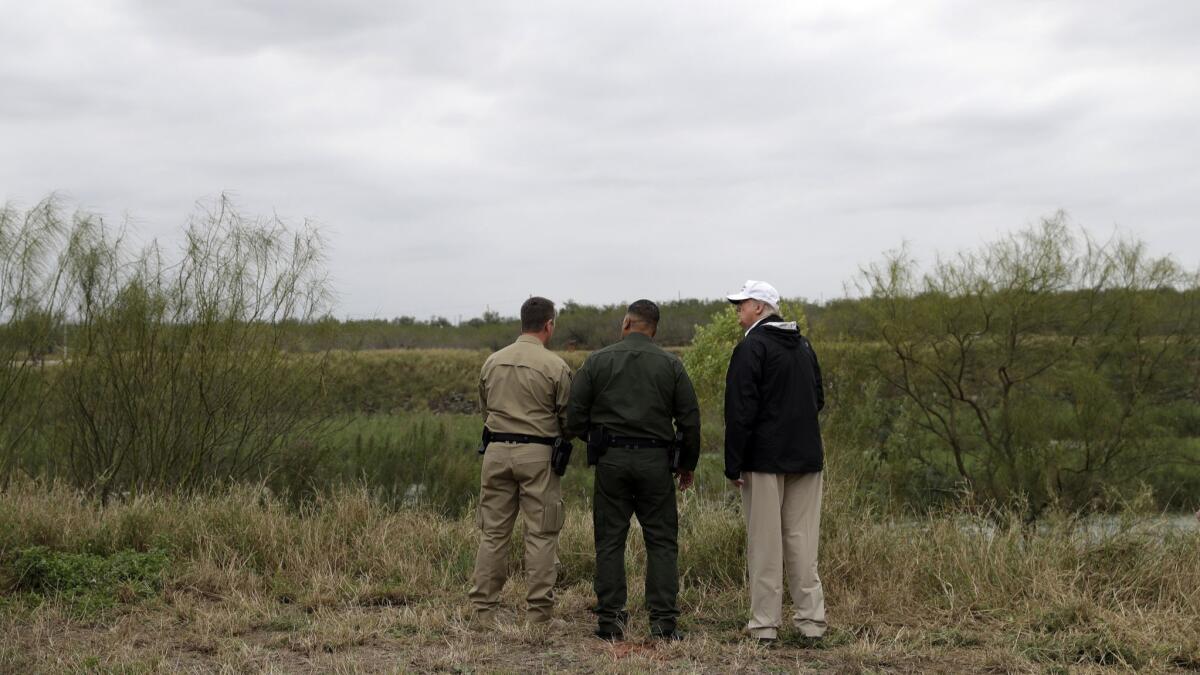Editorial: Face it, President Trump: Congress isn’t going to give you money for your wall

Faced with seemingly irreconcilable differences between the two parties’ positions on border security, top congressional appropriators nevertheless ground out a tentative deal Monday to fund much of the federal government through September. Many of the details have yet to be revealed, but the broad outline reflects a sensible compromise. And if President Trump signs on, Washington will avoid a repeat of the pointless shutdown that cost the taxpayers and the U.S. economy billions of dollars last month.
That’s a big if, however. Unlike the veteran lawmakers on the House and Senate appropriations committees, Trump does not seem to have much of a grasp on where the votes lie in Washington, or which way the political winds are blowing.
The tentative deal is expected to be finalized and voted on by Friday, when funding for nine federal departments and dozens of agencies is scheduled to run out — again. Notably, the deal would not give Trump the $5.7 billion he’d demanded for the “big, beautiful wall” he is eager to build along the southern U.S. border. Nor would it give Democrats the cap they sought on the number of immigrants in the country illegally who could be detained by Immigration and Customs Enforcement.
Contrary to the president’s campaign-style rhetoric, walls do not magically slash crime, interdict the flow of illegal drugs or end human trafficking.
We sympathize with the Democrats’ effort to rein in the administration’s expansive deportations. The point behind the proposed cap was to force ICE to focus on deporting serious criminals who are in the country illegally, not longtime residents whose only offense was to violate immigration law. But the proposal was too easily caricatured by Trump as an effort to unleash hardened “criminal aliens” on unsuspecting Americans. And like the many other policy issues involving migrants and legal immigrants, it would be best resolved through a comprehensive bill overhauling the country’s current, flawed approach to immigration — not an overdue spending bill that expires in seven months.
As for border walls, they can be part of the border-security discussion when and if Congress takes up a comprehensive immigration bill. But Trump has grossly oversold the value of building new physical barriers along the border. Contrary to the president’s campaign-style rhetoric, walls do not magically slash crime, interdict the flow of illegal drugs or end human trafficking.
Predictably, Trump told reporters Tuesday that he was “not happy” about the deal, although he wasn’t committing himself one way or the other. If he’s even the least bit realistic, though, he’d see that he has lost leverage with Congress since Democrats took control of the House in November. Trump rejected a bipartisan offer in December that included $1.6 billion for 65 miles of improved border fencing; the tentative deal struck Monday includes less than $1.4 billion for about 55 miles of fences. Note to the president: Elections matter.
Beyond that, forcing another shutdown would sink the president further in the public’s esteem. Polls have consistently shown that most Americans do not support Trump’s wall, and that an even larger majority oppose shutting down the government to try to force Congress to fund that project. The longer the last shutdown stretched out, the further Trump’s already weak approval ratings fell.
Yet Trump may not be swayed by the disastrous results of the first shutdown. For one thing, he seems to care less about public opinion generally than the feelings of his most passionate supporters, who have embraced the idea of a border wall. For another, Trump may believe that he can pin the next shutdown on the Democrats.
Enter the Fray: First takes on the news of the minute »
But the public has shown over the years that it knows whom to blame when Washington cannot perform its most basic function, namely, funding the government. If there’s another shutdown, Trump will be the one taking the government hostage — again.
The president would also be wise not to try to circumvent Congress by declaring a national emergency and shifting funds to the wall from some other project. Such a move would likely be declared unlawful by the courts, and even if it isn’t, it would set a horrible precedent for future presidents to usurp Congress’ power over the federal purse.
The stark reality for Trump is that he cannot have a wall that the public doesn’t want and Congress will not fund. The only question is how long it will take him to recognize that.
Follow the Opinion section on Twitter @latimesopinionand Facebook
More to Read
A cure for the common opinion
Get thought-provoking perspectives with our weekly newsletter.
You may occasionally receive promotional content from the Los Angeles Times.






